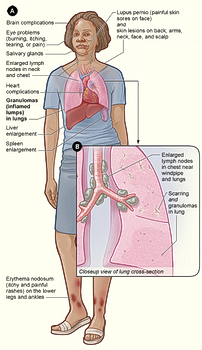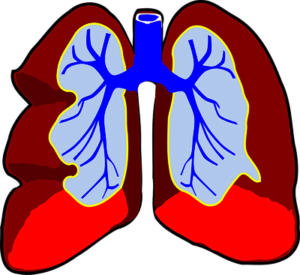Sarcoidosis Overview
Sarcoidosis is a rare disease that can affect multiple organs within the body—characterized by the formation of small abnormal masses known as granulomas, which are part of the body’s immune system.

This condition can impact various organs, leading to a variety of symptoms. Although the precise cause of sarcoidosis remains elusive, researchers believe it involves an abnormal immune response, but that is not conclusive.
In one case, a 55-year-old man who has a strong immune system was diagnosed with the disease. An MRI found he has lymph nodes in his lungs, causing him to run out of breath by just walking up a flight of stairs. Although this condition is not fatal, the question arises how a physically fit individual be infected with the disease? More studies are needed.
Granulomas – The Explanation
As mentioned, one of the primary trademarks of sarcoidosis is the development of granulomas, a tight cluster of cells to fight off an infection or foreign substance commonly known as inflammation.
Granuloma development can be caused by pathogens, damaged cells, toxic compounds, and other conditions that infect the body. This inflammation can form in organs such as the lungs, lymph nodes, skin, eyes, heart, liver, and nervous system. The distribution of granulomas throughout the body contributes to the variability in symptoms and clinical manifestations.
The Organs
Lungs

This organ is the most commonly affected by sarcoidosis disease, and pulmonary symptoms are among the most prevalent. Individuals may experience persistent cough, shortness of breath, and chest pain. In some cases, the ailment may advance to pulmonary fibrosis, a condition that results in the scarring of lung tissue, compromising respiratory functions.
Skin
Rashes and lesions are common symptoms of this disease. The manifestations on the skin can vary in appearance and include painful red nodules. Lupus pernio is one of these manifestations that can cause potential disfigurement. It is not essentially painful, but if other organs are affected, other symptoms could occur.
Heart and Nervous System
Cardiac sarcoidosis is a rare form of the disease, but it is concerning for individuals who have it as it can lead to cardiac complications. Studies have shown that cardiac sarcoidosis occurs in approximately 5-25% of people with sarcoidosis. However, it is a bit harder to diagnose since the developing symptoms are common with other heart-related ailments, such as arrhythmia.
Individuals who believe they may have this form of sarcoidosis should confer with their cardiologist regularly.
Treatments
Corticosteroids, the term used to group anti-inflammatory medications, are the most commonly prescribed drugs to reduce immune activity. Prednisone is one of the most popular meds prescribed in this group. A spray may be prescribed for those with pulmonary (lung) sarcoidosis.
Conclusion
Sarcoidosis is an inflammatory disorder that can affect various organs but is most commonly found in the lungs. The exact cause is unknown, but many medical researchers believe it involves an abnormal immune response.
Other factors may be from inheritance, and scientists are not ruling out environmental triggers, such as exposure to certain chemicals or infectious agents.
Research is ongoing to find the specific causes of this disease. Regular monitoring and medical follow-ups are crucial for individuals with this rare condition.

